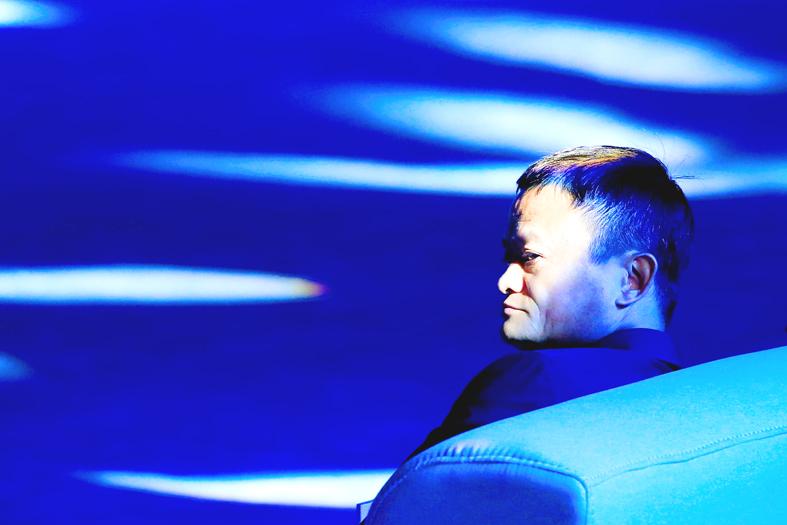Chinese billionaire Jack Ma (馬雲), founder of e-commerce giant Alibaba Group Holding Ltd (阿里巴巴), is to step down as president of the elite business school he founded after having been caught in a Beijing clampdown on tech titans, the Financial Times reported Monday.
Ma, formerly one of China’s most flamboyant entrepreneurs, has largely disappeared from public view since Alibaba’s fintech arm was investigated and fined by regulators for alleged monopolistic practices.
The Financial Times report cited sources as saying that Hupan University — an elite academy for Chinese business executives established in Ma’s hometown of Hangzhou in 2015 — has changed its name and would restructure its curriculum.

Photo: Reuters
Ma is not to hold a high-level title at the restructured organization, the report said, as Beijing seeks to limit his influence.
“Hupan is like an elite community, it’s one of [the authorities’] main targets,” a person who worked with Ma was quoted as saying by the Financial Times.
Videos on Chinese social media earlier this month showed construction workers using a blowtorch to remove characters from a large “Hupan University” sign.
The Financial Times last month reported the university was forced to suspend new student enrolments after pressure from Beijing to dismantle Ma’s fintech empire.
In a series of blows for the group, Alibaba was last month fined a record 18.2 billion yuan (US$2.8 billion) by antitrust authorities, and its fintech arm, Ant Group Co (螞蟻集團), was ordered to restructure after a planned listing was scuppered.
Alibaba’s reprimand is believed to have been triggered by a speech that Ma gave in October last year, in which he criticized state financial institutions for being outdated.
The crackdown has since widened to include many of Alibaba’s competitors in China’s ballooning tech sector.

SETBACK: Apple’s India iPhone push has been disrupted after Foxconn recalled hundreds of Chinese engineers, amid Beijing’s attempts to curb tech transfers Apple Inc assembly partner Hon Hai Precision Industry Co (鴻海精密), also known internationally as Foxconn Technology Group (富士康科技集團), has recalled about 300 Chinese engineers from a factory in India, the latest setback for the iPhone maker’s push to rapidly expand in the country. The extraction of Chinese workers from the factory of Yuzhan Technology (India) Private Ltd, a Hon Hai component unit, in southern Tamil Nadu state, is the second such move in a few months. The company has started flying in Taiwanese engineers to replace staff leaving, people familiar with the matter said, asking not to be named, as the

The prices of gasoline and diesel at domestic fuel stations are to rise NT$0.1 and NT$0.4 per liter this week respectively, after international crude oil prices rose last week, CPC Corp, Taiwan (台灣中油) and Formosa Petrochemical Corp (台塑石化) announced yesterday. Effective today, gasoline prices at CPC and Formosa stations are to rise to NT$27.3, NT$28.8 and NT$30.8 per liter for 92, 95 and 98-octane unleaded gasoline respectively, the companies said in separate statements. The price of premium diesel is to rise to NT$26.2 per liter at CPC stations and NT$26 at Formosa pumps, they said. The announcements came after international crude oil prices

DOLLAR SIGNS: The central bank rejected claims that the NT dollar had appreciated 10 percentage points more than the yen or the won against the greenback The New Taiwan dollar yesterday fell for a sixth day to its weakest level in three months, driven by equity-related outflows and reactions to an economics official’s exchange rate remarks. The NT dollar slid NT$0.197, or 0.65 percent, to close at NT$30.505 per US dollar, central bank data showed. The local currency has depreciated 1.97 percent so far this month, ranking as the weakest performer among Asian currencies. Dealers attributed the retreat to foreign investors wiring capital gains and dividends abroad after taking profit in local shares. They also pointed to reports that Washington might consider taking equity stakes in chipmakers, including Taiwan Semiconductor

A German company is putting used electric vehicle batteries to new use by stacking them into fridge-size units that homes and businesses can use to store their excess solar and wind energy. This week, the company Voltfang — which means “catching volts” — opened its first industrial site in Aachen, Germany, near the Belgian and Dutch borders. With about 100 staff, Voltfang says it is the biggest facility of its kind in Europe in the budding sector of refurbishing lithium-ion batteries. Its CEO David Oudsandji hopes it would help Europe’s biggest economy ween itself off fossil fuels and increasingly rely on climate-friendly renewables. While